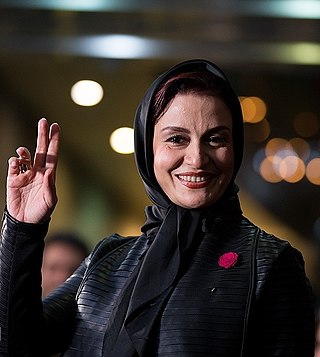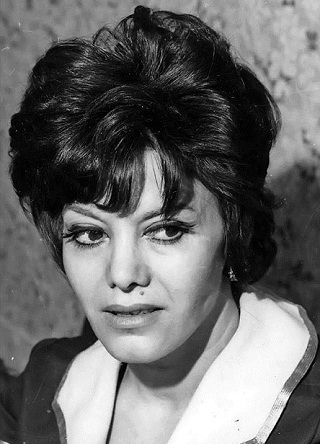Gallery
- Lady Shabaji (1958)
- Pretty Foe (1962)
- King of Hearts (1968)
- Shining Star (1969)
- Reza Motorcyclist (1970)
- Nikah Halala (1971)
- The Dagger (1972)
- Torkaman (1974)
- Mashti Mamdali's Car (1974)
- The Beehive (1975)
- The Crookes (1974)
Filmfarsi (Persian : فیلمفارسی, literary Persian Film), is a term used in Pre-revolutionary Iranian cinema criticism that was coined by Iranian film critic Hushang Kavusi. The term is used to describe what was perceived as low-quality films mostly copied from the Bollywood cinema and with poor plots, mostly arranged with dance and singing. [1] [2] Filmfarsi were suppressed after the Iranian Cultural Revolution by more strict laws on relations between men and women, as well as religious opposition to the content of the films. The suppression of the Filmfarsi genre encouraged the Iranian New Wave of modern films in Iranian cinema. Many of the Filmfarsi that survived the Iranian revolution did so thanks to the existence of illegal VHS copies. [3]
According to BBC's Yousef Latifpour (یوسف لطیف پور), the plots of many Filmfarsi are based on "incredible accidents" or "exaggerated misunderstandings", where conflicts between tradition and modernism usually end "in favor of tradition". [4] Within Filmfarsi, there existed unique genres of film such as "Jāheli" (جاهلی), described by some as "hyper-masculine", in which tough male characters would save women from "a life of disgrace", such working as a prostitute or cabaret singer. [5] [6] Other common genres of Iranian film prior to the Iranian revolution included thrillers, melodramas, musicals and action movies. While the films varied in theme, many of them shared common traits such as a "low production value" and "one-dimensional archetypes". [7]
The 1978 Cinema Rex fire is often seen as the catalyst for the demise of Filmfarsi; over 400 civilians were killed by SAVAK while attending a screening of the controversial movie "The Deer". [8] [9] [10] After Iran became an Islamic Republic in 1979, many commonly seen features of Filmfarsi, such as women acting as an object of "sexual desire" or not wearing a hijab, were now frowned upon, and the genre was actively suppressed. [11] [12]

Reza Shah Pahlavi was an Iranian military officer, politician, and first shah of the House of Pahlavi of the Imperial State of Iran and father of the last shah of Iran. He reigned from 15 December 1925 until he was forced to abdicate by the Anglo-Soviet invasion of Iran on 16 September 1941. Reza Shah introduced many social, economic, and political reforms during his reign, ultimately laying the foundation of the modern Iranian state. Therefore, he is regarded by many as the founder of modern Iran.

The cinema of Iran, or of Persia, refers to the film industry in Iran. Particularly Iranian art films have garnered international recognition. Iranian films are usually written and spoken in the Persian language.
A cursory glance at the history of art reveals that social, political and economic conditions have always played a major role in the emergence of new artistic currents and styles. As an example Flight by Morteza Katouzian is showing the marginalized people who have no freedom as result of political changes. In Iran, the social and political developments of the 1940s radically altered the evolution of this country's plastic arts and entirely altering its natural path.
Intellectual movements in Iran involve the Iranian experience of modernity and its associated art, science, literature, poetry, and political structures that have been changing since the 19th century.

Bahrām Beyzāêi is an Iranian playwright, theatre director, screenwriter, film editor, and ostād ("master") of Persian letters, arts and Iranian studies.

Samuel Khachikian was an Iranian film director, screenwriter, author, and film editor of Armenian descent. He was one of the most influential figures of Iranian cinema and was nicknamed "Iran's Hitchcock".

Parviz Sayyad is an Iranian-born American celebrated actor, director, translator, and screenwriter of Iranian cinema. He was one of the earliest television stars in Iran.

Ebrahim Hatamikia is an Iranian film director, screenwriter, cinematographer and actor. Hatamikia is known for films depicting the Iran–Iraq War's impact on Iran. His films are considered some of the best ever made in the Iranian war cinema and most notable for their attention to social changes brought about by the war. Also, he is best-known for his explorations of the trauma by the war; both on returning soldiers and those who await them, unable to mourn effectively without knowing the fate of their loved ones.

Nassaji MazandaranFootball Club is an Iranian football club based in Qa'em Shahr, Mazandaran. They currently compete in the Persian Gulf Pro League.

Pejman Bazeghi is an Iranian actor.

Merila Zarei is an Iranian actress. She is one of the most influential actresses after the Islamic Revolution of Iran, who has acted in the films of great directors such as Asghar Farhadi, Ebrahim Hatami Kia, Pouran Derakhshandeh, Reza Attaran, Abbas Kia Rostami and Masoud Kimiaei.
BBC Persian is the Persian language broadcast station and subsidiary of BBC World Service which conveys the latest political, social, economical and sport news relevant to Iran, Afghanistan, and Tajikistan, and the world. Its headquarters are in London, United Kingdom.

Hamid Reza Sadr was an Iranian football and film critic, journalist, author, university professor, historian, and economist. Sadr earned a Ph.D. in urban planning after studying at both the University of Tehran and the University of Leeds in England. He was well known for his publications on various subjects such as football, cinema, and non-fiction based on history and social studies.

Hanieh Tavassoli is an Iranian actress. She has received various accolades, including a Crystal Simorgh and an Iran Cinema Celebration Award, in addition to nominations for five Hafez Awards and an Iran's Film Critics and Writers Association Award.
Gholam Reza Afkhami is an Iranian-born American scholar, author, educator, and a former Pahlavi Iran government official. He is the senior scholar and director of Social Science Research and International Studies at the Foundation for Iranian Studies. The Foundation for Iranian Studies is a Bethesda, Maryland-based research institution dedicated to the study of Iranian history, culture, economy and politics, created with the financial support from Princess Ashraf Pahlavi.

The Reza Abbasi Museum is a museum in Tehran, Iran. It is located in Seyed Khandan. The museum is named after Reza Abbasi, one of the artists in the Safavid period. The Reza Abbasi Museum is home to a unique collection of Persian art dating back to the second millennium BC, from both the pre-Islamic and Islamic eras.

The Islamic Republic of Iran Army, acronymed AJA, simply known as the Iranian Army or Artesh, is the "conventional military of Iran" and part of Armed Forces of the Islamic Republic of Iran. It is tasked to protect the territorial integrity of the country from external and internal threats and to project power.

Socialism in Iran or Iranian socialism is a political ideology that traces its beginnings to the 20th century and encompasses various political parties in the country. Iran experienced a short Third World Socialism period at the zenith of the Tudeh Party after the abdication of Reza Shah and his replacement by his son, Mohammad Reza Pahlavi. After failing to reach power, this form of third world socialism was replaced by Mosaddegh's populist, non-aligned Iranian nationalism of the National Front party as the main anti-monarchy force in Iran, reaching power (1949–1953), and it remained with that strength even in opposition until the rise of Islamism and the Iranian Revolution. The Tudehs have moved towards basic socialist communism since then.

Marjaneh Golchin is an Iranian actress. She started her career in television and starred in season 1 of “Mirror” directed by Gholamhussein Lotfi in 1985. She is best known for appearances in Shabash by Hamed Kolahdari and in series such as King of Ear by Davood Mirbagheri, Bezangah by Reza Attaran, 3 Dong 3 Dong by Shahed Ahmadlou and Armando directed by Ehsan Abdipoor.

Fakhri Khorvash was an Iranian stage and film actress and director. She received the best actress award at the Sepas Film Festival in 1971 for her performance in the film Mr. Naive.